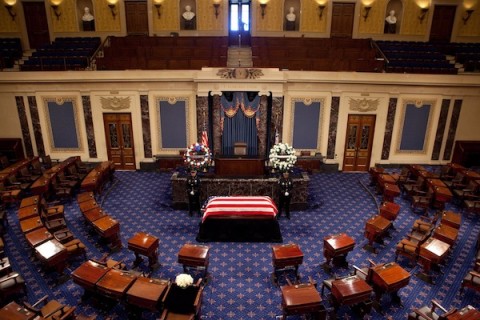Savings Dwindling, Millions of Unemployed Play the Waiting Game
Benefits stopped coming to LuAnn Greer two weeks ago. She’s cut her expenses to the bare minimum, but doesn’t know when she’ll see another unemployment check.
Jul 31, 20205K Shares109.6K Views
Without Sen. Robert Byrd (D-W.Va.), whose casket lay in repose in the Capitol on Thursday, Democrats were unable to pass an extension of unemployment benefits. (epa/ZUMApress.com)
The unemployed now know that Congress cannot help them — at least not yet. After attempting to gain cloture and move forward to a majority-rules vote on an extension of federal unemployment benefits three times in as many weeks, the Senate finally gave up and went home. Moderate Republican Sens. Olympia Snowe and Susan Collins of Maine joined Democrats in voting for the extension on Wednesday. But without Sen. Ben Nelson (D-Neb.), who broke ranks to vote no, or Sen. Robert Byrd (D-W.Va.), who passed away earlier in the week, Democrats came up one vote short.
[Economy1] After the failed vote, Majority Leader Harry Reid (D-Nev.) saidDemocrats would wait until after the July 4 recess to vote on the deficit-increasing $34 billion extension of benefits to Nov. 30. By the time the Senate does pass the bill — on July 12 at the very earliest — at least 2.14 million Americans will have lost their benefits. The good news? Those benefits are retroactive; the unemployed will be able to apply for the benefits they lost out on, and will eventually get checks. The bad news? Many of those 2.14 million Americans will have to make do with very little in the meantime.
Even if Congress extends the benefits, the lapse is unprecedented — and the hurt it causes is palpable. Never before has Congress let unemployment benefits expire with joblessness still so prevalent, according to an analysisfrom the Center of American Progress and National Employment Law project. During the most recent recession, after the collapse of the stock bubble in 2001, Congress created federal unemployment benefits to supplant state programs, and kept them until the unemployment rate was 5.8 percent. During the much more severe recession in the early 1980s, Congress let extended federal benefits expire when unemployment was 7.2 percent. Even the most optimistic forecasts do not suggest the United States will see that unemployment rate again until 2012 or 2013, at the earliest.
Moreover, even when Congress reinstates the federally extended benefits, unemployed Americans will have spent as many as 10 weeks without the checks — checks that often keep families just out of poverty and in their homes. Among the unemployed themselves, responses range from earnest hopefulness to despair.
Benefits stopped coming to LuAnn Greer, laid off from her job in the entertainment industry in Las Vegas after 17 years, two weeks ago. She is eager to point out that she is all right: She has nobody to support but herself, as her husband passed away and her children are grown up. But her unemployment checks were barely enough to live on, given her mortgage, upkeep on her home and expenses for prescriptions. She is now drawing down the last of her savings and selling her car. Even if her last tier of benefits kicks in, in a few weeks, she might move to Southern California to live with her son, leaving her two-bedroom, one-and-a-half bath to the bank.
“I’ll work as soon as I can get it,” she says, noting that she started working when she was still a teenager, and up to this point, aside from taking a few weeks off when she had her children, had never stopped. “The hard times won’t be forever, and at some point we’ll all be back on our feet.” But while the unemployment checks have stopped coming, she says, she plans to focus on cooking at home, avoiding the heat in shops’ and friends’ air-conditioning and giving up her smoking habit, with the aim of whittling her spending down to as few dollars a day as possible.
“Might be the recession that kicks the cigarettes for me,” she notes. “I guess that’s your silver lining right there.”
For many other unemployed Americans who have shared their stories over email, the outlook is less rosy. Experts agree that the picture is bleak.
“It is a tragedy that Congress has left millions of Americans to spend the … July holiday in despair because their elected leaders couldn’t pass a single bill — over the course of several months — to help people who are unemployed through no fault of their own and are falling farther and farther behind in the worst downturn since the Great Depression,” Christine Owens, the head of the National Employment Law Project, said on Thursday. “Congress has failed the unemployed again, and in the process has shown an inexcusable disdain for the real suffering of millions of families relying on the jobless safety net, and indifference to the real harm this inaction will cause the economy.”

Paula M. Graham
Reviewer
Latest Articles
Popular Articles
